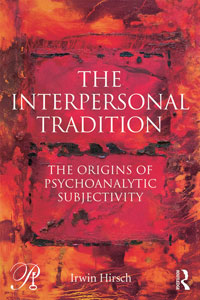Irwin Hirsch (USA)
 In The Interpersonal Tradition: The Origins of Psychoanalytic Subjectivity, Irwin
Hirsch offers an overview of psychoanalytic history and in particular the evolution of interpersonal thinking, which has become central to much contemporary psychoanalytic theory and practice. This book of Hirsch’s selected papers provides an overview of his work on the topic over a thirty year period (1984-2014), with a new introductory chapter and a brief updating prologue to each subsequent chapter.
In The Interpersonal Tradition: The Origins of Psychoanalytic Subjectivity, Irwin
Hirsch offers an overview of psychoanalytic history and in particular the evolution of interpersonal thinking, which has become central to much contemporary psychoanalytic theory and practice. This book of Hirsch’s selected papers provides an overview of his work on the topic over a thirty year period (1984-2014), with a new introductory chapter and a brief updating prologue to each subsequent chapter.
Hirsch offers an original perspective on clinical psychoanalytic process, comparative psychoanalysis, and psychoanalytic theory, particularly explicating the many ways in which interpersonal thinking is absolutely central to contemporary theory and practice. Each chapter is filled with theoretical explication and clinical examples that illustrate the degree to which the idiosyncratic person of each psychoanalyst inevitably plays a significant role in both analytic praxis and analytic theorizing. Key to this perspective is the recognition that each unique individual analyst is an inherently subjective co-participant in all aspects of analytic process, underscoring the importance that analysts maintain an acute sensitivity to the participation of both parties in the transference-countertransference matrix. Overall, the book argues that the interpersonal psychoanalytic tradition, more than any other, is responsible for the postmodern and relational turn in contemporary psychoanalysis.
Based on a range of seminal papers that outline how the interpersonal psychoanalytic tradition is integral to understanding much of contemporary psychoanalytic thought, this book will be essential reading for practitioners and students of psychoanalysis.
Review
“In this, his second book, Dr. Hirsch, like Diogenes, continues his tradition of holding up a light to psychoanalysis, therapeutic interaction, and unflinchingly himself as part of the process. Some of this is not very comfortable, but an unsparing authenticity, in Dr. Hirsch’s view, is the essence of analytic inquiry. He presents an excellent overview—to which I can personally attest—of the development and relevance of the interpersonal tradition; and then, in a series of focused chapters, limns out his personal emphases.
I highly recommend this book that, above all, reminds us that psychoanalysis is and always was a radical outsider activity and that complacency is our greatest enemy.’
– Edgar Levenson, MD, William Alanson White Institute, USA
Published by the Routledge Psychoanalysis in a New Key series. For more details, or to request a review copy, please visit: www.routledge.com/9780415749527
 Irwin Hirsch, PhD, is a practicing psychoanalyst and teacher of psychoanalysis in New York City. He is the author of over 75 journal articles and book chapters and the Goethe Award winning book, Coasting in the Countertransference: Conflicts of Self-Interest between Analyst and Patient (Routledge, 2008).
Irwin Hirsch, PhD, is a practicing psychoanalyst and teacher of psychoanalysis in New York City. He is the author of over 75 journal articles and book chapters and the Goethe Award winning book, Coasting in the Countertransference: Conflicts of Self-Interest between Analyst and Patient (Routledge, 2008).
Irwin Hirsch, PhD
25 E. 86th Street
New York, NY 10028
email: Irwin Hirsch


